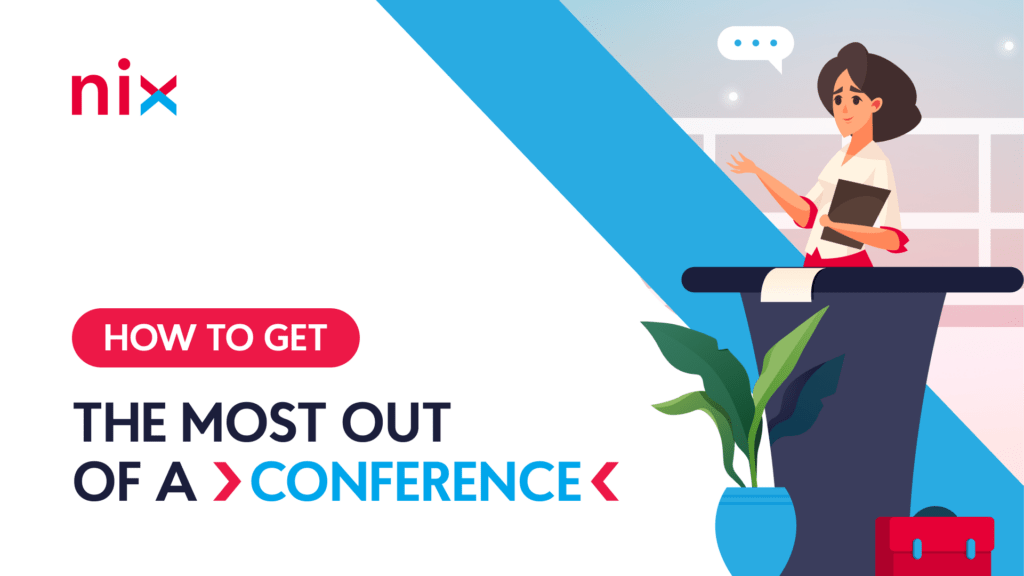Setting a goal to attend numerous conferences and investing substantial time and money may yield different outcomes. Iurii Gomon, a business analysis expert on the NIX IT team, shares practical tips on selecting conferences that align with your expectations and extracting the most value from your participation at different conferences.

Why Attend Conferences?
Before diving into the conference circuit, ask yourself, “Why do I need to attend these conferences?” Your answer will define the purpose of your participation, which could include:
- Networking: Connect with industry experts, exchange contacts, and follow each other on social media for post-event collaboration.
- Learning: You may not know all the benefits of a particular business analysis technology, but someone else has been using it for a long time and can share insights.
- Validation: Test your hypotheses by engaging with other participants and seeking opinions from industry experts. For example, conduct a survey among other participants, ask for the opinion of industry experts to understand whether you are on the right track in your research, or draw certain conclusions.
- Promotion: Present your company or project to attract potential customers or investors.
- Talent Acquisition: It is precious for those professionals who have open vacancies in their teams. After all, specialized events bring together talents looking for new career opportunities. During it, you can encourage a specialist to try out your company.
- Personal Branding: For experienced professionals, participating in public events (not just as a speaker) is an excellent way to showcase their expertise in a particular field and be heard in the professional community.
- Cultural Exposure: Attending international conferences can help understand diverse business cultures and learn more about the specifics of doing business in other countries directly from representatives of these countries.
How to Network at a Conference
Regardless of your goals, networking should always be a priority. Observing the audience’s openness to communication is crucial. If they seem receptive, initiate conversations by introducing yourself and suggesting relevant discussion topics, for example, about a particular lecture topic.
If the participants are not in the mood to talk or you are not comfortable being the first to take the initiative, try this approach:
Play the role of a “psychologist”
Timing is Key: Analyze the situation before approaching someone. Avoid interrupting individuals engaged in personal activities and wait for the right moment. Notice someone looking around? Ask if they have a few minutes to spare. If so, you’ll be adding a new contact to your network.
Don’t start the conversation with a question: Instead of bombarding with questions, use phrases like, “I wouldn’t mind talking…” to show genuine interest without overwhelming the other person.
Give the person the opportunity to refuse to communicate correctly. Phrases like: “I wouldn’t mind talking…”, “I can join your discussion because I heard a topic that interests me,” etc. In this way, a person will not feel like they are at a job interview when they are “attacked” with questions. On the contrary, they will see that you are interested in their opinion and will be more likely to engage in conversation.
If you want to engage with a speaker, express appreciation for their presentation and approach them at an appropriate time, avoiding disruptions to their schedule.
Pay attention to the conference schedule. If the speaker is about to start another presentation, don’t distract them with questions. They need to collect their thoughts before the following speech. Do you see a queue for an expert? It’s better not to join the crowd but to meet the speaker in a more relaxed atmosphere and ask your questions in person.
Explore side events
These events may be included in the conference program after the conference is over—for example, an after-party. Participants gather in an informal atmosphere to drink coffee or wine and talk with others on free topics. While conversations might be less work-focused, they provide opportunities to understand other cultures and industry perspectives.
Harness the Power of Small Talk
Initiate small talk during breaks to set the tone for deeper conversations. Asking for impressions of the conference or specific presentations can serve as a subtle introduction.
Usually, in between speeches, participants go to the catering area and coffee machines. It is logical to start a conversation with these topics. “There is delicious bruschetta there,” “Do you mind if I sit at your table?” – such simple phrases will help start a conversation and move on to professional or other more severe issues.
After defining the goals, let’s move on to choosing a conference.
Choosing an event – what should a business analyst pay attention to?
There are a lot of conferences for business analysts. Before selecting a conference or an IT event, consider the following:
- Topics and Speakers. Read the schedule and determine the issues of the reports you are interested in. Check which presentations are relevant to your business interests. It’s great if the speakers are authorities in the field. This way, you can learn more about proven life hacks and market trends, as well as have the opportunity to meet those who are developing this area.
- Target audience. You can find it on the event’s website (if it’s specified in the event description) or ask the organizers for a current list of target audiences. Verify if the conference caters to your expertise level, as some events focus on basic concepts while others delve into advanced topics.
Why is it important? Conferences for beginners focus on simple topics, basic approaches, and tools for work. Experienced participants are more interested in more profound, more complex things, practical cases, and how to solve specific problems. At one time, I was interested in gaining basic knowledge for a business analyst in IT, for example, drawing a UML diagram (software development process modeling – ed.), making a backlog (a list of tasks – ed.), or depicting user experience to improve user interaction with the product. Now, it is more critical for me to hear from experts about trends in business analysis, particularly how my colleagues are developing and what from their experience can be helpful to me. I am looking for insights both in IT and outside of it. Business analysis is developing, and participation in conferences or webinars allows me to keep up with it.
Feedback from previous participants. Read reviews on social media or the event’s website to gauge previous participants’ experiences.
Ask your colleagues about their impressions if they attended the event.
Price is quality. How do you understand if it is worth to attend a conference?
It’s time to conduct a cost-benefit analysis – to compare the costs (time, material, physical) and possible benefits for the money. Calculate the ticket cost, travel, accommodation, and meals, and compare this data with the likely benefits. These can be helpful to contacts, new knowledge, a job offer, etc. Compare the conference you are interested in with other, more affordable events, such as webinars on a similar topic. It will help you finally decide whether it is worth participating in this event or if it is enough to limit yourself to a webinar/online course where you will receive the same knowledge at a time convenient for you and for free.
As a business analyst, I advise my colleagues to attend such specialized conferences. Subscribe to the event pages on social media and follow the announcements:
- Building Business Capability. It is one of the largest and most famous conferences for business analysts. It is held in the USA.
- PMBA Conferences. The largest conference for business analysts was held in North America.
- European Business Analysis Day. An annual conference held in Germany.
- Business Analysis Conference. International conference on business analysis in Turkey and South-Eastern Europe, organized by BA-Works.
- BA & Beyond. Founded in Brussels in 2018.
- BA Life. Annual online conference. BA Life became a finalist in the National StartUp Awards in 2022.
- Global Business Analysis Day. It is a free online conference that lasts 24 hours.
- Balkan Business Analysis Conference It has been held annually since 2012.
- Festival of Business Analysis. Held in Asia and Australia. There is a possibility of personal and online participation.
- Business Analysis Conference Europe. Annual European conference on business analysis, held for 15 years in a row.
Learning to memorize the most important things
While attending an event, for example, an IT conference, it might initially feel like you’ve absorbed every detail. However, the following day, especially if the event was intense, you may realize that recalling everything is challenging. I suggest not relying solely on your memory but jotting down the most intriguing aspects. Here’s what works for me:
Mind-Map: All you need is a notebook and a pen. Capture the ideas that surface after listening to something. Illustrate the connections between thoughts graphically. For instance, if you’re in a presentation on Impact Mapping, note the topic and use underlining or circling to identify the focus quickly. Highlight the principal components (goals, participants, impact, outcome), and use arrows to illustrate connections. This approach saves time compared to extensive note-taking.
Abstracts from the Speaker’s Speech: Record the main points and new information—no need to construct complete sentences.
Getting Things Done Methodology: This personal productivity system, developed by David Allen, assists me in managing new information from conferences efficiently. For instance, if you learn about a new tool, jot down its name and add ‘familiarize yourself with it’ to your to-do list. Do the same with other information gathered at the event. Organize the tasks into smaller ones by priority or project specifics. Separate tasks that can be delegated to someone. Regularly update your lists, cross off completed tasks, and add new ones. This way, you’ll avoid worrying about forgetting something and can track your progress.
In my personal experience, specific methods of gathering information at events haven’t proven effective:
Shooting Video: Focusing on the filming process may cause you to miss exciting moments, and some speakers might feel uneasy in front of a camera. It’s worth noting that organizers often prohibit video recording.
Voice Recorder: Listening back to and deciphering recorded speeches can be inconvenient.
Detailed Notes: There’s a risk of writing down information you already know instead of gaining insights. Concentrating solely on this format might hinder your enjoyment of the conference atmosphere.
However, feel free to experiment and find what works best for you.
Applying Conference Insights in Your Work
Integrating insights gained from conferences into your current work is a valuable strategy for professional development. By doing so, you evolve professionally and provide your team with tangible examples of practical solutions. I had the opportunity to meet Debra Paul at a conference, where I was delving into business analysis through her books. Engaging with her allowed me to inquire about the competency framework outlined in one of her works. This interaction significantly improved my ability to assess analysts’ work and identify directions for their professional development. The conference helped streamline my work processes.
Sharing the most exciting and practical insights with your team is crucial. Even if you haven’t discovered anything new, your notes can be valuable to others. These insights extend beyond topics directly related to your profession and can encompass broader developmental aspects. For instance, if you learned novel ways to overcome “imposter syndrome” from a speaker, initiate a discussion with your colleagues. Explore their perspectives on these methods and gauge whether they support such approaches. Such conversations often contribute to fostering a deeper appreciation for the results of one’s work.
Thorough preparation is key to extracting the maximum benefit from participating in conferences. Develop a comprehensive plan outlining what you intend to do during and after the event—select conferences where the knowledge gained can be directly applied to your work. Ultimately, value your time and view it as an investment in your professional growth.






